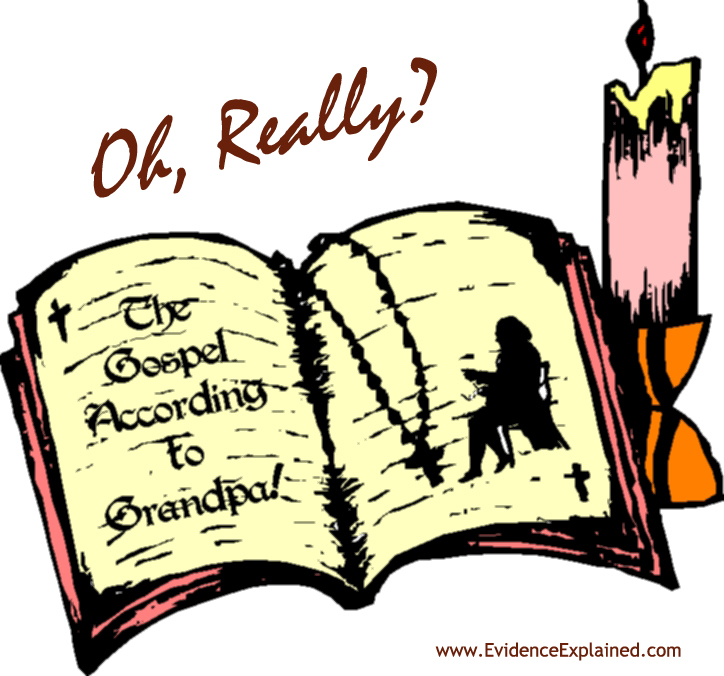
27 May 2014
Okay. This "Tuesday's Test" is not really a test. It's an opportunity to share your experience and the conclusions you have drawn from it. Here, we present several observations scholars across time have made about the value and reliability of oral history. Which of these best reflects your own findings—and why?
- "Tradition ... is always to be suspected and examined." —Jeremy Belknap, 1784.1
- "Griots are continually adding new embellishments to their tales. ... New versions of old traditions are picked up and passed along (while the old traditions or old versions are forgotten) ... with startling rapidity. The factual basis of the story or the reliability of the informant is not aways a factor in the dissemination of Senegambian traditions." —Donald Wright, 1979.2
- "As with revealed religion, some people are prepared to accept oral tradition, variations and all, as an act of faith." —Michael Kammen, 1991.3
- "Most respondents [to our survey] ... tended to value personal accounts by family members above those by professional historians because ... 'people I don't know—a professor, a movie—could be telling me any old thing, but grandparents get my complete trust.' ... [and because] family members 'would not embellish for the sake of trying to impress me'." —Rosenzweig and Thelen, 1998.4
- "The Oglala Sioux valued historical evidence that came out of 'personal accounts from grandparents or other relatives' and 'conversations with someone who were there. ... So powerful was this veneration of oral accounts passed on from trusted relatives and elders that Pine Ridge residents used this evidence and this way of knowing the past as the standard against which to judge other historical sources." —Roy Rosenzweig and David Thelen, 1998.5
- Oral history is the systematic collection of living people's testimony about their own experiences. Oral history is not folklore, gossip, hearsay, or rumor. Oral historians attempt to verify their findings, analyze them, and place them in accurate historical context." — Judith Moyer, 1999–2014.6
- "In the scholarly realm, oral history and its variations across disciplines are ... understood as a source of data [but] oral history always operates as an act of interpretation." —Paula Hamilton and Linda Shopes, 2008.7
What say you? How reliable is "oral history" in your experience? What efforts do you make to verify each piece of "oral history" that you use?
1 Jeremy Belknap, a founder of the Massachusetts Historical Society, quoted by Michael Kammen, Mystic Chords of Memory: The Transformation of Tradition in American Culture (New York: Vintage Books, 1993), 48.
2 Donald R. Wright, Traditions from the Gambia, vol. 1, Mandinka Griots (Athens, Ohio: Ohio University Center for International Studies, Africa Program, 1979), 15.
3 Kammen, Mystic Chords of Memory, 209.
4 Roy Rosenzweig and David Thelen, The Presence of the Past: Popular Uses of History in American Life (New York: Columbia University Press, 1998), 95.
5 Ibid., 170.
6 Judith Moyer, "What is Oral History," Do History" (http://dohistory.org/on_your_own/toolkit/oralHistory.html : updated 1999, still featured 18 May 2014).
7 Paula Hamilton and Linda Shopes, Oral History and Public Memories (Philadelphia: Temple University Press, 2008), viii.
Oral tradition used as a clue
In my experience we have to use oral tradition with caution. Most of the oral tradition in my family has turned out to have a grain of truth to it but often contains more error. We should evaluate these claims with documented sources using the Gelealogical Proof Standard.
An act of interpretation
In my husband's family (African descent), those few relatives who would even think about breaking the code of silence and share about the "old days," were more apt to tell about the black sheep of the family or the life events of other family connections than they were to speak about their own experiences. When I asked one of our more revered cousins about how she got recordings of interviews she conducted with our senior family members, she said, "They saw my pocket recorder and said, 'I'll tell you what you want to know, but you'll have to put that away.' I put it alway alright...right into my pocket and left it recording!" I've only heard a few of the stories, but they are definitely colored by individuals' own interpretation of events. Whenever possible, it is necessary to gain verification from original documents, newspapers, etc.
Oral history
Years ago I attended a lecture by an anthropologist who had been working with a Bella Bella Historian to record her lore. In each account of an incident or circumstance, the Historian noted exact identity of the person whose version she was reporting. This still is a sharp dig to my brain regarding importance of point of view.
On another front I was lucky recipient of a grandmother's account of her siblings, parents, aunts, uncles, grandparents, great-grandparents and some great-greats. She had vital dates and even causes of death in her memory. It all proved out as to accuracy except an opinion as to cause of death of one of her grandfathers, and a little confusion as to the 4th husband of one g-grandmother. Most of these people she had known personally, and her memory was truly remarkable. What a boon!